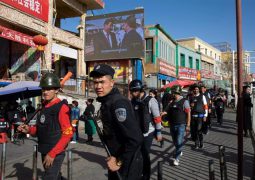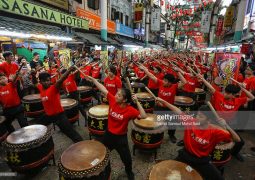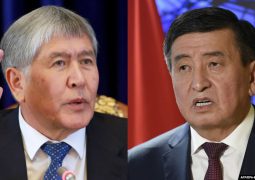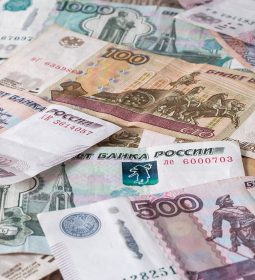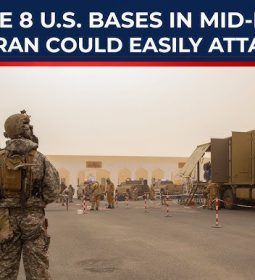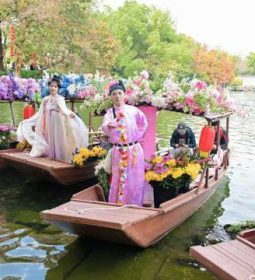What it’s like to be a Rohingya in KL: A daily battle for dignity
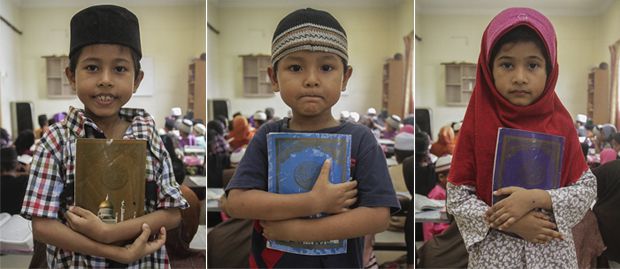
KUALA LUMPUR, Dec 12 — Every day at 5.30am, 34-year-old Abdul Rahman gets up from a “bed” which is actually just a thin piece of cloth spread over the cheap linoleum-covered floor of the room.
He would then tiptoe out to a common bathroom that is shared with another tenant — a Rohingya family just like his living in the other room.
Abdul Rahman tries his best not to wake his wife and five children; they sleep just next to him on the same thin cloth, sharing three pillows.
Only the linoleum provides him and his family some protection from the cold and rough concrete floor, that and the one large faded blanket they share.
For Abdul Rahman, who fled his home in the conflict-torn Rakhine state in Myanmar in search of a peaceful life in Malaysia two years ago, this tiny room — just 650 square feet — is a sanctuary.
Abdul Rahman, who spent a year in a detention centre for illegal migrants up north in Alor Setar, Kedah feels that a roof over his head is already a luxury; it provides him and his family great comfort to know they no longer need to be in fear of being murdered, a terrifying thought he lived with every day back in his village.
“I wake up early to collect plastic and metal to sell. On a good day I can make around RM30. But not every day is a good day. There are days when I only make RM10,” the soft-spoken Abdul Rahman said in native Rohingya.

Ustaz Rafi, a charismatic man known by many in the Rohingya community living on the rough side of Selayang Baru here, helped with the translation during this interview.
Rafi, a Rohingya who has lived in Malaysia for 35 years, runs a centre that provides temporary shelter and food for newly-arrived Rohingya refugees.
The children get some basic education while the parents — or in most cases just the mother since adult males often die while being smuggled into the country or due to the violence in Rakhine — find means to resettle. Abdul Rahman sends his kids there to learn English and Bahasa Melayu.
For the kids — Mumina,10; Mohd Shahid, 8; Suhail, 6 and Saadiah, 4 — the centre is the closest thing to school they will ever get here. Refugee children are not allowed to go to public schools because they are not recognised by the Malaysian government.
But with very little funding, the centre — a three-storey boxy building that Rafi rents for RM5,000 a month — has a classroom barely resembling those at even the poorest of schools in Malaysia.
Located on the top floor, five old, long wooden tables run across the 850-square feet room. No stools are available so the children, all in ragged clothes, sit on the floor while they recite either the muqadam (during Islamic religious classes), or primary school text books for English and Bahasa Melayu.

No help from Putrajaya
The books are all donated. So are the clothes worn by the children. But the oversized and scruffy clothing do not prevent the centre or their parents from ensuring the children maintain some sense of dignity as Muslims; the boys will always have their skull caps and songkoks on, and the girls their hijabs no matter how worn out they may be.
“The clothes and books we usually get from donation. Over the weekend we will usually hold joint programmes with say other NGOs, (rich) individuals or universities who want to do voluntary work. So they will come here and bring us books and clothes.
“So we make do with what we have and use the books to teach them. Mondays and Tuesdays are English, Bahasa and Myanmar (their national language). Thursdays and Fridays are for religious teachings,” Rafi said while pointing to the centre’s humble library.
The centre, which started operating in 2011, receives no funding or donations from the government or any political parties, surviving only on donations and contributions from the parents fortunate enough to get jobs illegally.

“We need at least RM30,000 a month to run the centre. Rent alone is RM5,000. Sometimes some individual will give us RM1,000, some NGOs will give a little bit more. We seldom make enough.
“But we do what we can to survive and Alhamdulillah, we have done quite ok since then,” Rafi said.
From the RM30 he makes on most days, half will be saved for rent (RM450 for rent and RM100 for utilities a month). The other half will be used either to buy baby food or napkins for his youngest son, the rest spent on fish or chicken.
“On a good day, me and family can get to eat fish. On the bad days, we will try and save so we just fry eggs and eat with vegetables,” he said with a smile.
Abdul Rahman looks strong; his body sturdy, hands muscular from work. Back home he farmed and did construction work but because refugees are not allowed to work in Malaysia, collecting and reselling plastic, steel or aluminium waste is the only work available to him now.
“I’ve been doing this for a year since I can’t find any job. Apart from the centre, nobody helps us either. What choices do I have?” he added.

State of precariousness
Refugees in Malaysia are officially prohibited from working, so most of them seek employment illegally in order to support their families.
This desperation places them in a perpetually precarious state where they are left at the mercy of their employers; sometimes they are made to work long hours for cheap pay.
This is a problem repeatedly raised by local and international human rights groups, including the United Nations High Commission for Refugees (UNHCR).
The illegal nature of their work and status means refugees, despite some carrying valid UNHCR documentation, often face the risk of arrest by the authorities.
Abdul Rahman has yet to receive his UNHCR card which makes him even more vulnerable. He said he has encountered the authorities several times while he was out collecting plastic and such, often leading to him having to bribe them to escape detention.
“Yes, I’ve had to bribe before,” he said. “That’s become normal.”
When he first arrived in Selayang, Abdul Rahman used to walk for kilometres under the sun and rain to collect these plastic and metal to resell. After saving his meagre earnings, he managed to buy a used three-wheeled trishaw. This allows him to travel further from his home and collect more.
But Abdul Rahman said he stays away from certain areas. Being a Rohingya refugee means you live in a heightened state of alert; he has been robbed and assaulted a few times before.
“Because we are aliens in a foreign land, they (locals) look down on us… they see me carrying those things (and assume I have money) so they rob me,” he said, without elaborating further.
There was fear in his voice as he spoke about these incidents. When asked to give details, he shied away. Rafi said this was because he feared revealing too much would expose him to some form of retaliation, especially since the perpetrators are often Malays, the country’s ethnic majority.
“We as foreigners in a foreign land, we can’t complain much. Who are we to ask for rights? Even our mother country we have to ask for it, I don’t think we can do much here,” Rafi said.
Longing for normalcy
Back at home the cheerful but composed Mumina helps her mother clean and cook. Every day at 6.30am she will wake up to pray, and later help her younger brothers and sister prepare to go to the centre for classes. Her mother stays home with their baby brother while they go to “school.”
Their room is located about one and a half kilometres away from the centre, and they walk there every day… Mumina, being the eldest, is tasked to watch over the others. Since they cannot afford any backpacks, they carry their notebooks and pencils in their hands.
“We don’t have a bicycle. We wish we had one but we can’t afford,” she said in Bahasa Melayu as she sat in the front passenger seat of my car. We were on the way from the centre to their home. That was the first time she had ever been in a private car in Malaysia.
I asked her and her brother, who also now speaks quite decent Bahasa Melayu, if they had any local friends since they have stayed there for close to two years.
Her neighbourhood is mostly Chinese and Indians. Like her family, these are low income earning families who rent rooms.
“We don’t have any friends. Well, maybe one or two but they are Myanmar. No Malays,” she said with a smile.
The alienation felt by Mumina and her siblings is the norm for Rohingya refugee children here; they avoid playing outside with local kids as the authorities are ever on the lookout for their parents in order to collect duit kopi, the street slang for bribes.
Rafi said the centre also does not encourage the children to play outside the centre for security reasons. Some have been harassed while the location of the centre, close to the main road leading to the wholesale market, could expose them to harm. So for most of the children, the centre has become the only reality they know.
I asked Mumina if they ever wished to go home. She didn’t know how to reply. From her reaction it felt like half of her wanted to stay while the other is missing home tremendously.
Her father, replying for her, said he does wish to go home, which is why when Prime Minister Datuk Seri Najib Razak attended the December 4 protest against military violence in the Rakhine state last month, there was a bit of hope that the Myanmar government could be pressured into recognising the Rohingyas as citizens.

Both Abdul Rahman and Rafi could not help but point out the poor treatment and lack of help the community has received in Malaysia despite many having lived in the country for more than two decades.
“We know that it could just be politics. But we are afraid if we say too much it would jeopardise our safety.
“But we do hope that the concern given now could draw attention to our plight and this would pressure the Myanmar government to recognise our rights. We are not asking for much, we just want to be treated like a citizen. I think it’s a fair demand,” Rafi said.
UNHCR estimates that there are around 45,000 Rohingyas in Malaysia, and the numbers are expected to grow as renewed violence swept across the Rakhine state.
In the meantime, the Rohingyas continue to live here. Struggling to keep their dignity as they fight to survive.
- Previous Kyrgyzstan amends constitution in referendum, boosting government powers
- Next ADB approves $415 million grant to support Afghanistan’s energy security




